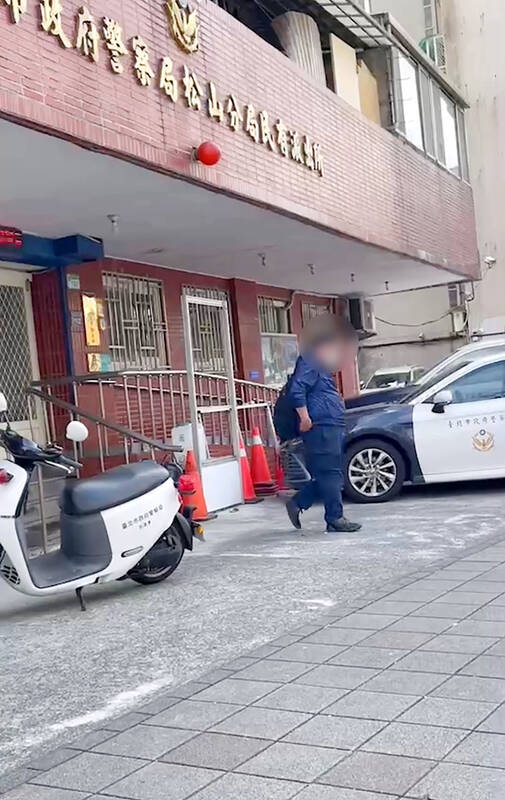A man who allegedly threw urine at the entrance of the Taipei office of the Nikkei Shimbun on Friday would be punished in accordance with the law, police said.
Officers at the Songshan Precinct were called to the scene after receiving information that the office of the Japanese newspaper had been splashed with an unknown liquid, which was later confirmed to be urine.
The suspect, who was asked to exchange his ID for a visitor’s pass when entering the building, was later identified as a man surnamed Tien (田), who would be summoned for questioning, police said.

Photo: CNA
Tien would be contravening the Social Order Maintenance Act (社會秩序維護法) and could face defamation charges if the newspaper files a lawsuit, police said.
The incident occurred just days after the Nikkei Shimbun reported that about 90 percent of retired Taiwanese military officers have visited China to pass intelligence about the military to Chinese authorities in exchange for money.
The report cited a former military officer using the pseudonym Cheng Tsung-hsien (鄭宗賢) as saying that after he retired in the 2010s, he received “special status” in China for providing intelligence about Taiwan’s armed forces.
However, after Cheng reported all that he knew about the military, the Chinese authorities made trouble for him and forced his restaurant out of business, the report said.
“Even so, I still admire China and don’t have any regrets,” the newspaper quoted Cheng as saying.
The report also cited unnamed military personnel as saying that most officers identify as “Mainlanders,” or waishengren, a term that refers to people who came to Taiwan with the then-Chinese Nationalist Party (KMT) government in 1949 after it lost the Chinese Civil War.
If an armed conflict with China were to break out, the military would not be able to fight, the newspaper cited the source as saying.
The report has sparked outrage across Taiwan’s political spectrum.
An official from the Taipei Economic and Cultural Representative Office in Japan on Wednesday morning delivered a letter to the Nikkei Shimbun’s headquarters in Tokyo, expressing regret over what it said was a failure to fact-check the report, besmirching the reputation of the military.
The office also asked the newspaper to refrain from biased reporting.
Representative to Japan Frank Hsieh (謝長廷) wrote on social media that he trusted the Nikkei Shimbun’s editorial team to check the veracity of the report, calling on people to refrain from irrational behavior such as attacking the newspaper’s offices.
Asked about the report at a question-and-answer session at the legislature, Premier Chen Chien-jen (陳建仁) said all military personnel identify with their country, regardless of political affiliation.
“Rumors stop with the wise,” Chen said, calling the report “unfounded.”
The KMT on social media called the report “egregious rumor mongering,” saying it has dealt a blow to the morale of the military.
Asked by reporters about the report, Veterans Affairs Council Minister Feng Shih-kuan (馮世寬) seemed visibly annoyed and used expletives before saying that the article was “full of nonsense.”
The legislature’s Foreign Affairs and National Defense Committee on Thursday passed a motion to find out if any military officers who retired within the past five years leaked state or military secrets to China.
The committee asked the Ministry of National Defense, the Ministry of Justice and the Mainland Affairs Council to report their findings to the legislature.
However, the KMT criticized the motion, saying it showed a lack of confidence in the armed forces.

An essay competition jointly organized by a local writing society and a publisher affiliated with the Chinese Communist Party (CCP) might have contravened the Act Governing Relations Between the People of the Taiwan Area and the Mainland Area (臺灣地區與大陸地區人民關係條例), the Mainland Affairs Council (MAC) said on Thursday. “In this case, the partner organization is clearly an agency under the CCP’s Fujian Provincial Committee,” MAC Deputy Minister and spokesperson Liang Wen-chieh (梁文傑) said at a news briefing in Taipei. “It also involves bringing Taiwanese students to China with all-expenses-paid arrangements to attend award ceremonies and camps,” Liang said. Those two “characteristics” are typically sufficient

A magnitude 5.9 earthquake that struck about 33km off the coast of Hualien City was the "main shock" in a series of quakes in the area, with aftershocks expected over the next three days, the Central Weather Administration (CWA) said yesterday. Prior to the magnitude 5.9 quake shaking most of Taiwan at 6:53pm yesterday, six other earthquakes stronger than a magnitude of 4, starting with a magnitude 5.5 quake at 6:09pm, occurred in the area. CWA Seismological Center Director Wu Chien-fu (吳健富) confirmed that the quakes were all part of the same series and that the magnitude 5.5 temblor was

The brilliant blue waters, thick foliage and bucolic atmosphere on this seemingly idyllic archipelago deep in the Pacific Ocean belie the key role it now plays in a titanic geopolitical struggle. Palau is again on the front line as China, and the US and its allies prepare their forces in an intensifying contest for control over the Asia-Pacific region. The democratic nation of just 17,000 people hosts US-controlled airstrips and soon-to-be-completed radar installations that the US military describes as “critical” to monitoring vast swathes of water and airspace. It is also a key piece of the second island chain, a string of

The Central Weather Administration has issued a heat alert for southeastern Taiwan, warning of temperatures as high as 36°C today, while alerting some coastal areas of strong winds later in the day. Kaohsiung’s Neimen District (內門) and Pingtung County’s Neipu Township (內埔) are under an orange heat alert, which warns of temperatures as high as 36°C for three consecutive days, the CWA said, citing southwest winds. The heat would also extend to Tainan’s Nansi (楠西) and Yujing (玉井) districts, as well as Pingtung’s Gaoshu (高樹), Yanpu (鹽埔) and Majia (瑪家) townships, it said, forecasting highs of up to 36°C in those areas